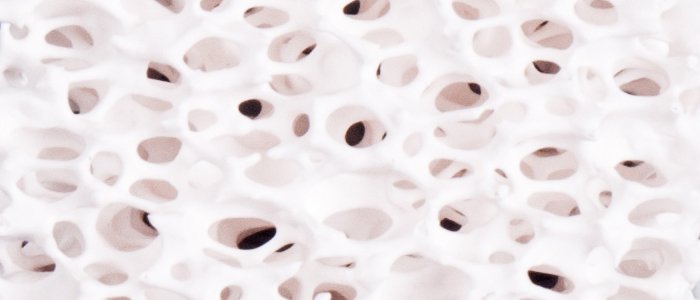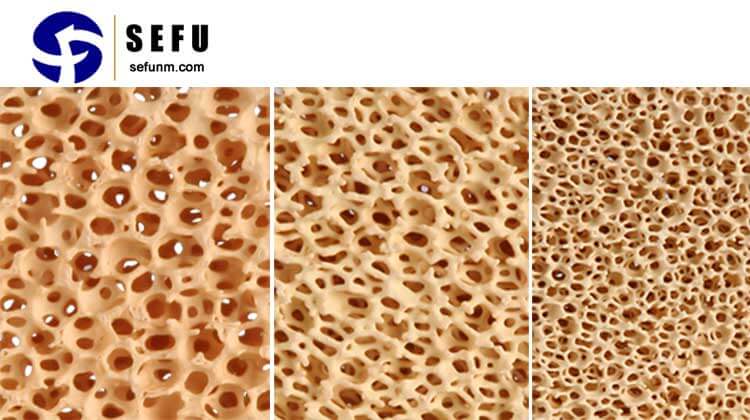Introduction:
Ceramic foam filters play a vital role in various industrial applications, providing efficient filtration of impurities from molten metals and alloys. The choice of ceramic material used in the manufacturing of these filters is crucial, as it directly impacts their performance, durability, and suitability for specific applications. This essay aims to compare different ceramic materials commonly used for the production of ceramic foam filters, analyzing their properties, advantages, limitations, and suitability for specific filtration applications. By examining the characteristics and performance of different ceramic materials, industries can make informed decisions when selecting the most appropriate material for their ceramic foam filters, ultimately improving the quality of end products and enhancing filtration processes.
Section 1: Alumina (Al2O3) Ceramic Foam Filters
Alumina, also known as aluminum oxide, is one of the most commonly used ceramic materials in the manufacturing of ceramic foam filters. It offers excellent thermal stability, chemical resistance, and mechanical strength. Alumina ceramic foam filters are particularly suitable for applications involving molten aluminum, as they exhibit high resistance to aluminum corrosion. They provide efficient filtration of inclusions, oxides, and other impurities, leading to improved casting quality. Alumina filters are widely used in the foundry industry, specifically in aluminum casting processes.

Section 2: Silicon Carbide (SiC) Ceramic Foam Filters
Silicon Carbide (SiC) is a highly popular ceramic material extensively used in the manufacturing of ceramic foam filters. It possesses exceptional thermal and chemical stability, making it an ideal choice for high-temperature applications. SiC ceramic foam filters exhibit excellent resistance to thermal shock and chemical attack, ensuring reliable performance in demanding filtration processes.
One of the key advantages of SiC filters is their remarkable thermal stability. They can withstand extreme temperatures without undergoing significant structural degradation, making them suitable for applications involving molten metals at elevated temperatures. The thermal stability of SiC filters allows for prolonged exposure to high heat without compromising their filtration efficiency.
![]()
Chemical resistance is another notable characteristic of SiC filters. They exhibit resistance to corrosive molten metals, acids, and alkalis. This resistance enables SiC filters to maintain their structural integrity and filtration efficiency when exposed to aggressive chemical environments, providing reliable and efficient impurity removal.
SiC ceramic foam filters also demonstrate excellent mechanical strength, ensuring their durability during the filtration process. Their robustness allows for effective filtration and retention of impurities without compromising the structural integrity of the filter.
Moreover, SiC filters possess a unique combination of properties that make them ideal for applications involving both ferrous and non-ferrous alloys. They are commonly used in the foundry industry for the filtration of various metals such as iron, steel, aluminum, and copper alloys. SiC filters effectively remove impurities, including inclusions and oxides, resulting in improved casting quality and reduced defects.
Section 3: Zirconia (ZrO2) Ceramic Foam Filters
Zirconia is a ceramic material that stands out for its remarkable mechanical strength and toughness. It exhibits excellent thermal shock resistance and maintains its structural integrity even at high temperatures. Zirconia ceramic foam filters are highly suitable for applications involving aggressive molten metals and alloys, such as those containing reactive elements. They provide efficient filtration while withstanding thermal and chemical stresses. Zirconia filters are commonly used in the aerospace and specialty alloy industries.

Section 4: Magnesium Oxide (MgO) Ceramic Foam Filters
Magnesium Oxide (MgO) is a ceramic material with excellent thermal stability and chemical resistance, making it suitable for high-temperature applications in ceramic foam filters. Magnesia ceramic foam filters exhibit remarkable resistance to alkalis and slags, making them ideal for filtration processes involving reactive metals like magnesium and its alloys. With their high porosity and interconnected pore structure, MgO filters effectively capture impurities and oxides, leading to improved casting quality. While MgO filters may have lower mechanical strength compared to other ceramic materials, ongoing research aims to enhance their performance through the development of composite materials and the optimization of their pore structure. Overall, MgO offers significant advantages in industries where high-temperature and reactive metal casting processes are involved.
Section 5: Mullite (Al2O3·SiO2)
Mullite is a versatile ceramic material with a combination of alumina and silica. It offers a balance of thermal stability, mechanical strength, and chemical resistance. Mullite filters provide efficient filtration in a wide range of molten metal applications, including aluminum, steel, and copper alloys. They are particularly advantageous in situations where both thermal shock resistance and chemical durability are essential.
Section 6: Comparison of Properties
When comparing different ceramic materials for ceramic foam filters, several properties need to be considered. Thermal stability, chemical resistance, mechanical strength, and compatibility with specific molten metals are critical factors. Alumina excels in thermal stability and chemical resistance, making it suitable for a wide range of applications. Silicon carbide offers exceptional thermal and chemical stability, particularly in high-temperature environments. Zirconia provides excellent mechanical strength and resistance to aggressive molten metals. Mullite combines thermal stability, mechanical strength, and chemical resistance, making it versatile in various applications. Titania demonstrates excellent chemical stability and corrosion resistance, particularly in the presence of reactive metals.
Section 7: Application-Specific Selection
The selection of the ceramic material for ceramic foam filters depends on the specific application requirements. For example, alumina filters are commonly used in the aluminum casting industry due to their excellent resistance to aluminum corrosion. Silicon carbide filters are favored in applications involving ferrous and non-ferrous alloys, while zirconia filters find utility in industries with aggressive molten metals. Mullite filters offer a versatile solution for a wide range of applications, while titania filters are preferred for their corrosion resistance with reactive metals.
Section 8: Advancements and Future Directions
Advancements in ceramic materials and manufacturing techniques continue to expand the range of options for ceramic foam filters. Researchers are exploring new ceramic compositions, composites, and surface modifications to enhance the performance and properties of the filters. This includes the development of hybrid materials, nanoparticle reinforcements, and tailored surface coatings to improve filtration efficiency, mechanical strength, and chemical resistance.
Conclusion
The choice of ceramic material for the manufacturing of ceramic foam filters significantly impacts their performance and suitability for specific applications. Alumina, silicon carbide, zirconia, magnesium, and mullite are among the commonly used ceramic materials, each offering distinct properties and advantages. The selection depends on factors such as thermal stability, chemical resistance, mechanical strength, and compatibility with the targeted molten metals.
Advancements in ceramic material development and manufacturing techniques continue to drive the progress of ceramic foam filters, enabling improved filtration efficiency, durability, and customization options. The future holds promise for further advancements in material compositions, surface modifications, and hybrid approaches to enhance the properties and performance of ceramic foam filters in diverse industrial applications.
In conclusion, the choice of ceramic material for ceramic foam filters is a critical decision that directly impacts their filtration efficiency and durability. Understanding the properties and advantages of different ceramic materials allows manufacturers to tailor filters to specific industrial applications, ensuring optimal performance and high-quality end products. By considering factors such as thermal stability, chemical resistance, mechanical strength, and compatibility with molten metals, industries can make informed choices and continue to advance the field of ceramic foam filter technology.


